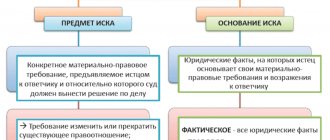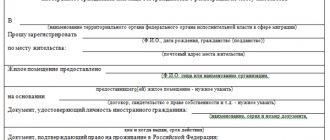Who falls into this category?
The legality of living in an apartment must be confirmed by official documents . The owner has priority rights to the living space (is it possible to evict the owner from the apartment?). Its legitimacy can be confirmed by a purchase and sale agreement, deed of gift, privatization forms, and inheritance documents.
Responsible tenants who have a social tenancy agreement also have legal grounds for residence, but cannot independently decide to move someone into the apartment. Residents registered in the premises can live there legally (we talked in detail about the grounds and conditions for eviction of citizens from municipal housing here, and from this article you will find out whether it is possible to evict a registered person from an apartment).
People who fall into one of the listed categories are considered illegal residents.:
- The former husband/wife, if he does not have his own share in the premises (how to evict former and current spouses or cohabitants from the apartment?).
- Tenants whose rental agreement has expired (read about how to evict tenants here, and from this article you will find out whether tenants can be deprived of their housing in the winter).
- Owners of housing who sold it but remained registered there.
- Citizens who were evicted by a court decision but did not leave their living space.
- Tenants living in specialized housing whose lease agreement has not been renewed.
You can learn more about who the former owners are and how to evict them from an apartment here.
The best solution to the problem is an agreement between the parties , but in practice it is not always possible to achieve understanding. It can be very difficult to expel an illegally living tenant. The owner will need both patience and time to find a legal way out of the conflict situation. There is no point in using force or intimidating such people. Illegal actions can easily turn the situation against the owner.
When is a claim filed?
Often the rights of the owner are violated by persons who become defendants in eviction cases:
- former spouses who are not the owners of the premises;
- former owners of the property and family members;
- illegally using housing;
- employers whose established tenure has ended and members of their families.
The reasons for eviction are the following facts:
- loss of the right to use housing or the absence of such initially (Article 35 of the Housing Code of the Russian Federation);
- systematic violation of rights of use;
- illegal redevelopment, improper use (in relation to the owner).
Under what conditions is it possible to evict an unregistered person who is not the owner from an apartment?
Living in residential premises of people without any documentary grounds for this causes an unambiguous reaction - to throw them out of their own property. But to do so would be to break the law. A solution to the issue should be sought in the legislative norms in force on the territory of the Russian Federation.
When evicting citizens who do not have the right to live there from living space, it is necessary to focus on the following regulations of the Russian Federation :
- Article 40 of the Constitution.
- Article 301 of the Civil Code.
- Articles 17, 83, 91 of the Housing Code.
- Article 213 of the Criminal Code.
- Article 20.1 of the Code of Administrative Offences.
- Section 333.19 of the Tax Code.
- Decree of the Government of the Russian Federation No. 25 of 2006.
No reasons or special conditions are required to initiate deportation proceedings. If the tenant does not have registration, a valid rental agreement, and is not the owner of at least a small share in the premises, then the question of the legality of his eviction does not arise.
The fact of illegal residence is confirmed by the lack of documentary grounds for being in the apartment.
Systematic violation of the rights of other owners
Another case, which is located next to the first for a reason, since they are very similar. I had to see how one tenant created unbearable conditions for the entire entrance.
For example, a compassionate woman gathered all the cats in the area in a one-room apartment. However, she was not too concerned about the conditions of the animals, and the smell spread over several floors. In addition, the owner preferred to additionally heat the apartment using a gas stove, which could lead to a fire.
But even in this case, achieving eviction is quite difficult - although there is plenty of good practice, it is always a very long and complex process.
How to evict unregistered persons from an apartment?
If the owner’s apartment is inhabited by unregistered persons who do not have any rights to housing, the owner can initiate eviction proceedings. The inability to reach an agreement peacefully leads to the only possible development of events - appeals to the appropriate authorities. The owner has two legal ways to obtain a positive result :
- Expel residents without trial, by contacting the prosecutor's office or law enforcement agencies.
- Obtain a court order for forced eviction.
Both options require a considerable amount of effort and time. Only the owner himself decides at what point to start; it is not legally prohibited to immediately go to court.
Without trial - procedure, costs, deadlines
You can expel illegally residing persons pre-trial by contacting the prosecutor . When choosing this method of dealing with violators of private property, you will need to provide the prosecutor with convincing arguments about the illegality of residence. If the situation is controversial, the prosecutor will forward the case to court.
Appealing to the prosecutor's office is less strict than to the court. The owner must collect the maximum possible documentary base and write a statement addressed to the prosecutor. The verification is initiated immediately after documents are accepted for processing, and the submission itself does not require payment of a state fee.
As for the timing of solving the problem, it all depends on the nuances of the case. Obtaining a prosecutor's sanction for forced eviction is very difficult . It is issued only if there is an immediate threat to the life of the owner, his family or unregistered persons.
When considering such cases, the prosecutor's office is guided by Article 45 of the Civil Code of the Russian Federation and acts within the framework of the powers prescribed there.
Can a local police officer evict someone from an unauthorized living space and under what conditions?
Unauthorized entry into someone else's property is an offense prosecuted by law. On this basis, the owner has the right to contact the district police officer with a request to expel the residents.
The procedure will be launched after the district police officer accepts a statement from the injured party. He will be required to do the following:
- Visit the apartment and find out the situation on the spot from the residents themselves.
- Interview your neighbors.
- Draw up a written conclusion - a protocol on the results of the inspection.
Illegal occupants are given a written requirement to leave the premises . It will take up to 5 days to complete it. Failure to act on the part of violators entails forced eviction, which is possible only with the sanction of the prosecutor or by court decision.
Application to the district police officer
A statement to the police is written in a conditionally free form. There are no special forms for writing, but you should adhere to the standard structure for presenting information.
The application to the district police officer must indicate the following information::
- The name of the law enforcement agency and the full name of the district police officer who accepts the form.
- Victim details – full name, residential address, contact phone number.
- The essence of the appeal.
- Applicant's signature and date of filing.
In the text itself, it is necessary to explain the situation that has arisen in as much detail and intelligibly as possible.
Through the court
The most common solution to the issue of eviction is to go to court. This authority will allow you to consider all aspects of the case and make an objective decision, which will have to be carried out either voluntarily or by force.
The procedure for eviction through court is as follows:
- documentation is collected;
- a statement of claim is written;
- all papers are registered in the secretariat of the court;
- court hearings are attended.
After a decision is made on the basis of the received order, forced eviction is carried out . Bailiffs and representatives of law enforcement agencies take part in the procedure.
Acceptance of a statement of claim in court is carried out only after payment. The plaintiff bears the costs. The state duty is 300 rubles (Article 333 19 of the Tax Code of the Russian Federation). The claim is considered within five days, after which a date for the first hearing is set. In total, the process may take 1-2 months.
List of documents
The plaintiff must collect and submit to the court a number of supporting documents . They include the following items:
- Forms confirming ownership of the specified residential area.
- Extract from the house register.
- Receipts for payment of utility bills.
If there are family ties with the defendant, you will need to provide documents proving the relationship.
Proof
The plaintiff must prepare and present to the court evidence of violation of his rights . In the case of illegal residence, these may include documentary evidence and testimony. These may be protocols from the district police officer on identifying the fact of violation. Recording the refusal of residents to vacate their living space. Photos and videos of evidence are also accepted in court, provided that they are of high quality and allow accurate identification of the individuals depicted on them.
Witness testimony will also help resolve the dispute by bringing clarity to the situation. They must be attached in writing, and it is also recommended to invite witnesses to court hearings.
Statement of claim
When drawing up a statement of claim, special attention should be paid to setting out the reasons for eviction . The text structure looks like this:
- Data of the defendant and his family members who live in the premises without sufficient grounds.
- Address of the disputed living space.
- Link to a document that is official proof of illegal residence. In most cases, this is the protocol of the district police officer.
- Duration of illegal residence.
- If there are other violations, a complete list of them is provided. For example, failure to comply with sanitary standards, inappropriate behavior, noisy parties, etc.
- Information about pre-trial settlement of the dispute.
Everything written is summed up by a request for the eviction of tenants who are living in the premises without reason.
Notice of eviction
This document contains a requirement to vacate the premises within a certain period of time on a voluntary basis. The eviction notice must include:
- information about the debtor;
- the court's decision;
- full name of the executive document;
- data on the living space where the citizen should be evicted.
Important! The notification may precede the statement of claim if the plaintiff wishes to resolve the conflict out of court.
What problems might arise?
It is impossible to vacate an apartment from unwanted tenants, even if they live there illegally, using force (read about how you can evict an unwanted neighbor from a communal apartment here). Intimidation, blackmail, and even more so physical harm are criminal offenses .
Such actions can turn the situation against the owner himself if the injured party files a complaint with law enforcement agencies. This will not allow them to avoid eviction, but the owner may receive a suspended or real sentence, with or without payment of material compensation.
Evicting people who occupy residential premises illegally is not easy . Despite the fact that private property is inviolable, the owner will have to go through several instances before he receives permission to forcibly remove him. It often takes several months to get the final result, but there is no need to rush things, it is better to follow the procedure and act within the law.
Give your friend a fait accompli
If you are not ready to engage in long discussions with balanced arguments and other diplomacy, you can simply tell your friend to vacate the premises. This is the fastest-acting method, but with a high risk of losing good relationships.
However, if you both have common sense and are considered good friends, all these circumstances will not disturb your friendship.
- Author: Dmitry Petrosyants









